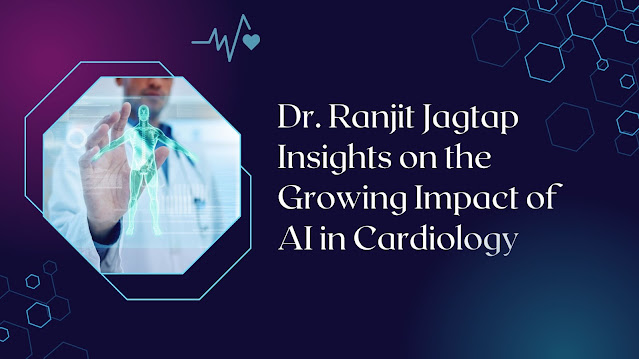The medical field has been rapidly evolving with the integration of artificial intelligence (AI), especially in cardiology, where precision and efficiency are paramount. Dr. Ranjit Jagtap, a renowned cardiothoracic surgeon, has been vocal about the impact of AI on cardiovascular healthcare. His insights highlight how AI-driven innovations are revolutionizing diagnostics, treatments, and patient care. For those keeping up with Dr Ranjit Jagtap news, his views on AI’s role in modern medicine are shaping discussions on the future of cardiac care.
In this blog, we will explore Dr. Jagtap’s perspective on AI in cardiology, its benefits, challenges, and how the future of cardiac care is being reshaped by this technology.
The Role of AI in Cardiology
AI in cardiology is not just a futuristic concept but a present-day reality. Machine learning algorithms and deep learning models are helping doctors analyze complex cardiac data with greater accuracy and speed. AI applications in cardiology include:
- Early Disease Detection: AI-powered tools can detect heart diseases at an early stage, helping in preventive care. Algorithms analyze ECGs, MRIs, and CT scans to identify abnormalities that might be missed by the human eye.
- Risk Assessment & Prediction: AI models evaluate patient history, lifestyle, and genetic factors to predict the likelihood of developing cardiovascular diseases.
- Robotic-Assisted Surgeries: AI-driven robotic systems assist surgeons in performing complex heart procedures with greater precision, reducing risks and improving patient outcomes.
- Telemedicine & Remote Monitoring: Wearable AI-powered devices track heart rates, blood pressure, and oxygen levels, ensuring continuous monitoring of cardiac patients.
Dr. Ranjit Jagtap emphasizes that AI in cardiology enhances decision-making by providing data-driven insights, which ultimately lead to better patient care.
Dr. Ranjit Jagtap’s Insights on AI in Cardiology
Dr. Jagtap believes that AI is a game-changer in cardiology but must be integrated thoughtfully. He highlights the following key points:
1. AI Improves Diagnostic Accuracy
Traditionally, diagnosing heart diseases required multiple tests and manual analysis. AI algorithms, trained on vast datasets, can now analyze patient data in real-time, leading to faster and more accurate diagnoses. Dr. Jagtap acknowledges that AI-driven diagnostic tools have improved early detection rates, significantly reducing mortality.
2. AI Supports Decision-Making for Cardiac Interventions
AI is now being used to guide cardiologists in selecting the most appropriate treatments for patients. By analyzing patient data, AI suggests treatment options with the highest success rates. Dr. Jagtap sees this as a major step toward personalized medicine.
3. AI Enhances Post-Surgical Care
Post-operative care is crucial in cardiac surgery. AI-powered monitoring systems help track a patient’s recovery, alerting doctors to any complications. Dr. Jagtap notes that this has led to reduced hospital readmissions and better long-term outcomes.
4. AI in Predicting Heart Attacks & Strokes
Predictive analytics powered by AI can assess a patient’s risk of heart attacks or strokes. By analyzing medical history, AI models identify warning signs early. Dr. Jagtap stresses that these tools empower doctors and patients to take preventive measures before critical conditions develop.
For those following Dr Ranjit Jagtap news, his latest updates highlight how AI is becoming an essential tool in heart disease management and intervention.
Challenges of AI in Cardiology
Despite its advantages, AI in cardiology also faces certain challenges:
- Data Privacy & Security: AI systems require vast amounts of patient data, raising concerns about data protection.
- Ethical Issues: AI-driven decisions must align with ethical medical practices.
- High Implementation Costs: Advanced AI tools can be expensive, making accessibility an issue for smaller healthcare institutions.
- Need for Human Oversight: AI should complement, not replace, medical professionals. Dr. Jagtap stresses that AI should support human decision-making rather than dictate medical treatments.
Future of AI in Cardiology
The integration of AI in cardiology is expected to grow exponentially. Dr. Jagtap predicts the following advancements:
- AI-driven robotic surgery will become more common.
- Personalized treatment plans based on AI analytics will improve patient outcomes.
- Wearable technology will offer real-time health tracking and alert patients to potential heart issues.
- AI-powered drug discovery will lead to new treatments for cardiovascular diseases.
Dr. Ranjit Jagtap envisions a future where AI works alongside medical professionals, enhancing efficiency and ensuring better healthcare for all. His perspectives in Dr Ranjit Jagtap news articles frequently discuss how AI can revolutionize the field while maintaining ethical standards.
Frequently Asked Questions (FAQs)
1. Can AI replace human cardiologists?
No, AI is meant to assist, not replace, human cardiologists. It provides data-driven insights, but medical expertise and human judgment remain essential.
2. How accurate is AI in diagnosing heart conditions?
AI-driven tools have demonstrated high accuracy in diagnosing heart diseases. However, they are most effective when used alongside traditional diagnostic methods.
3. What are the risks of using AI in cardiology?
Potential risks include misdiagnoses, data security concerns, and ethical issues. AI tools must be regularly updated and monitored to ensure accuracy.
4. Will AI make cardiac treatments more affordable?
In the long run, AI can reduce treatment costs by improving early detection, minimizing complications, and optimizing hospital resources.
5. How does Dr. Ranjit Jagtap view AI’s role in future cardiology?
Dr. Jagtap believes AI will enhance diagnostics, treatment precision, and post-operative care, but emphasizes that human expertise will always be vital in medical decision-making.
Conclusion
The growing impact of AI in cardiology is undeniable. Dr. Ranjit Jagtap’s insights highlight AI’s transformative role in diagnostics, treatments, and patient care. While challenges remain, AI’s potential to revolutionize cardiac healthcare is promising. With continued advancements, AI is set to redefine the future of cardiology, ensuring better outcomes for patients worldwide. Stay updated with Dr Ranjit Jagtap news for more insights into AI-driven advancements in cardiology.

Comments
Post a Comment